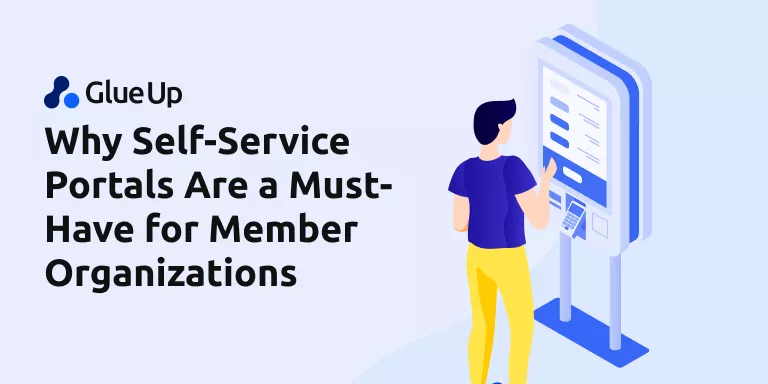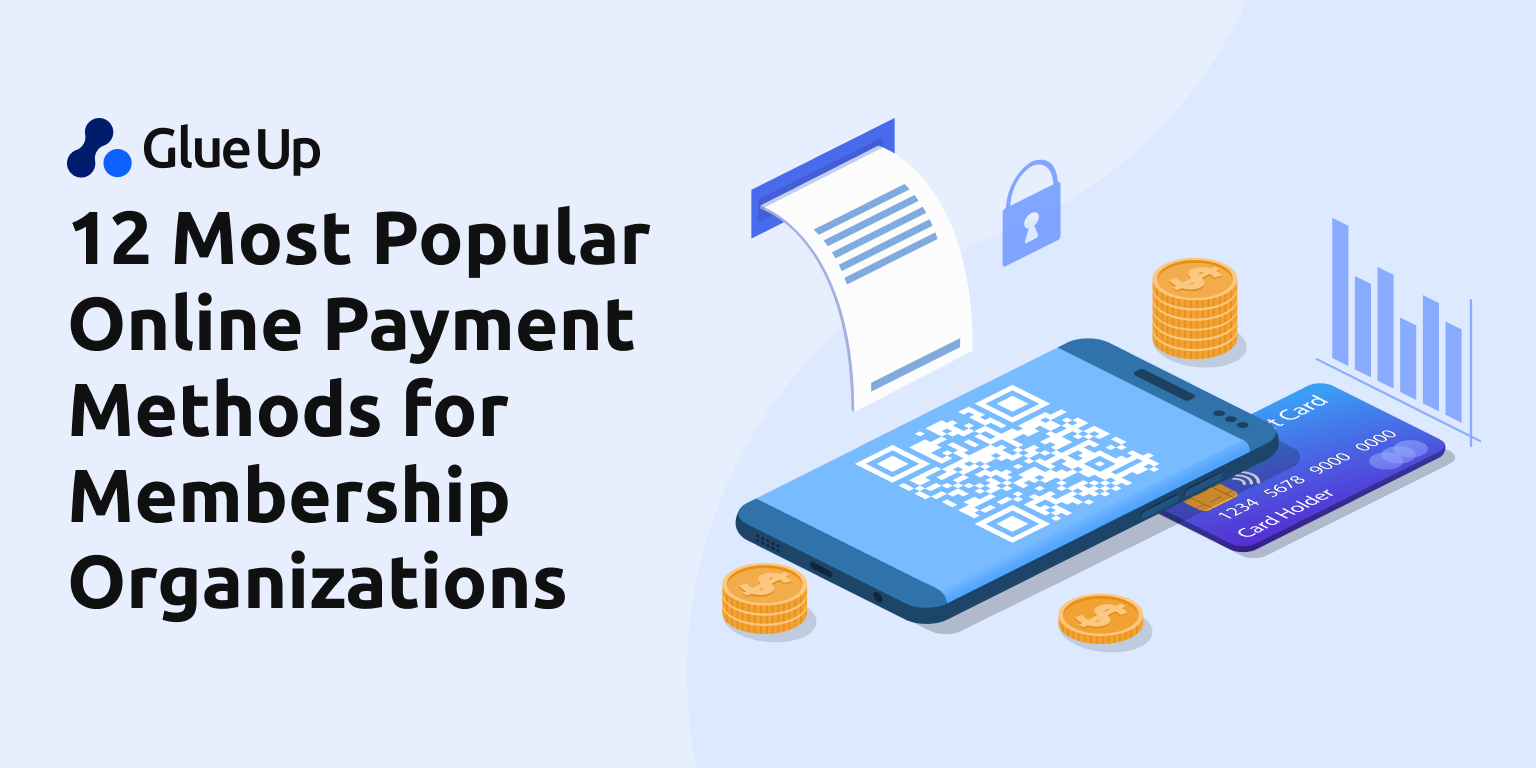
Running a membership-based organization requires an openness to diverse member preferences, especially concerning payment methods.
Every member has payment preferences—some prefer cards, while others opt for bank transfers, Google Pay, or Apple Pay. The strategic approach is to accommodate the preferences of all members, ensuring that none are compelled to leave due to the unavailability of their preferred payment method.
This blog highlights the 11 most popular payment methods available, guiding you to identify any potential gaps in your current payment options.
Read on to discover which payment methods you might be missing and explore opportunities for improvement, ultimately promoting member satisfaction and business success.
Key Takeaways
- Members have varying payment preferences, and a successful membership-based business accommodates a wide range of choices, including cards, bank transfers, digital wallets, and more.
- Traditional methods continue to play a significant role, while modern solutions such as digital wallets, mobile payments, and "Buy Now, Pay Later" (BNPL) are also gaining popularity.
- Digital wallets are rapidly gaining global acceptance, Mobile payments are becoming increasingly prevalent, and cryptocurrency is steadily gaining traction as a viable payment method.
- When selecting payment methods, factors such as security, user experience, and the demographics of the membership base are crucial.
- Glue Up's Membership Management Software offers a holistic solution that integrates diverse payment methods. The platform is accessible across devices, prioritizes privacy, and provides analytics, making it an all-in-one tool for membership organizations.
What is an Online Payment Method?
Let's quickly recall what a payment method is. It serves as the pathway through which customers, or in your case, members, choose to send their payments for the goods or services they purchase.
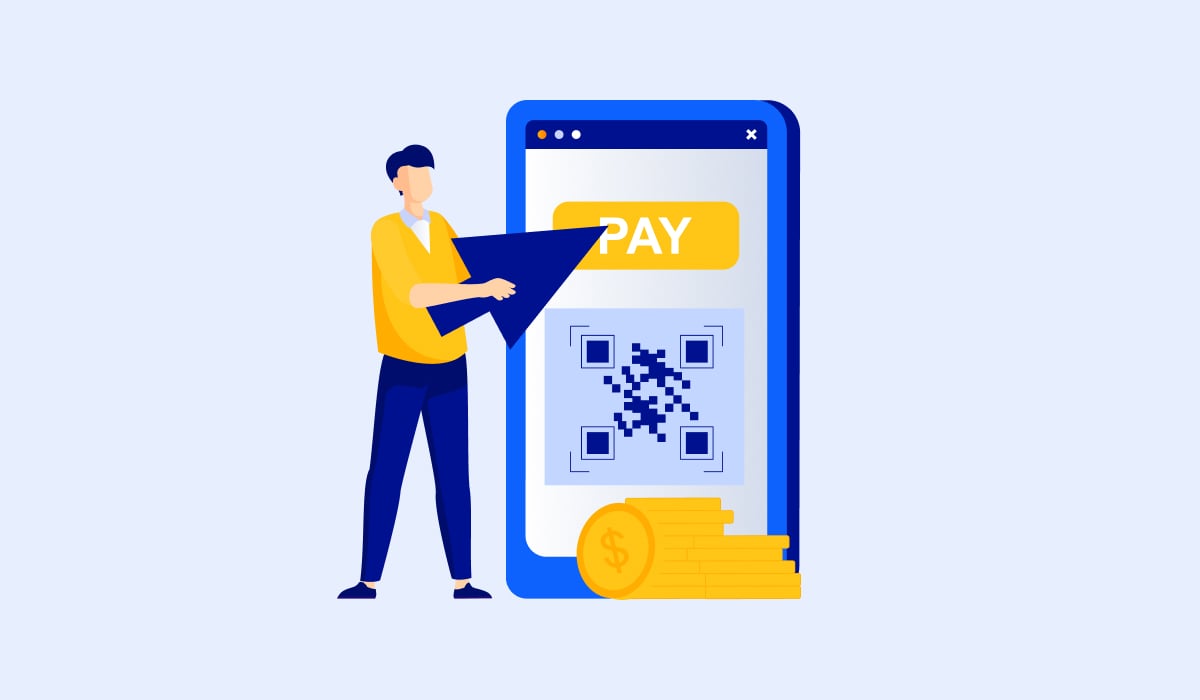
There are a wide variety of payment methods available. However, every method shares the same purpose: connecting businesses to customers and facilitating seamless, quick, and smooth transactions.
The diversity in payment methods caters to customers' varied preferences, ensuring a more inclusive and user-friendly purchasing experience.
Types of Online Payment Methods for Member-Based Organizations
Members are no longer limited to just one or two payment options; an extensive array of choices is available. Let's explore and identify the most widely used payment methods to better understand consumers' preferences and trends.
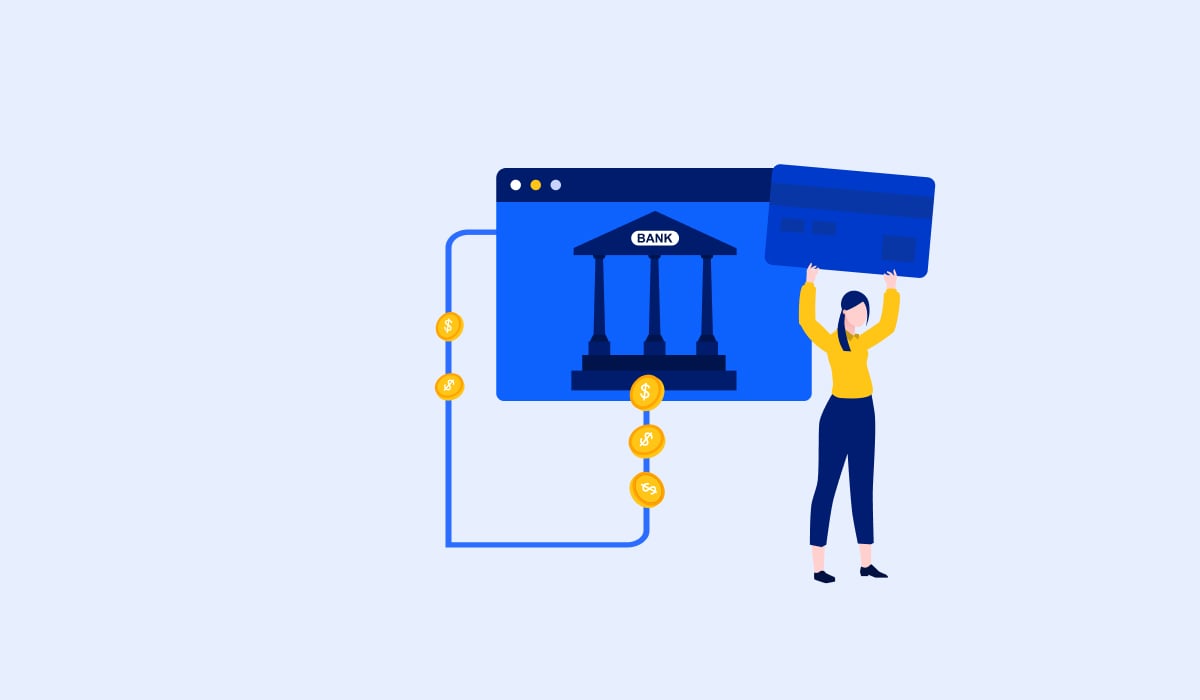
By recognizing and incorporating the most popular payment methods, businesses can enhance user satisfaction and streamline their members' payment experience.
Credit and Debit Cards
Credits and debits have become integral parts of our lives, and their significance cannot be denied. As we steadily progress toward a cashless society, our dependence on these financial instruments is increasing.
Paying through cards has emerged as the most practical and preferred option for customers. According to Forbes statistics, 90% of Americans with bank accounts prefer to pay via card. This encompasses debit cards 49%, credit cards 32%, virtual debit cards 5%, and virtual credit cards 4%. In contrast, only 9% of individuals opt for traditional methods like cash or checks.
Digital Wallets
Digital wallets, such as Google Pay, Apple Pay, PayPal, Alipay, Samsung Pay, etc., have revolutionized payment methods, providing a highly convenient method for users to send contactless transactions.
Members appreciate the simplicity of these platforms, where the need to enter personal details repeatedly is eliminated. The robust security measures implemented by these digital wallets also contribute to a sense of trust and confidence among users, ensuring minimal data compromise.
The widespread adoption of digital wallets is evident in the global user base, which stood at 3.4 billion in 2022, consisting of a significant 42.6% of the worldwide population. Projections for the future indicate substantial growth, with the number of global digital wallet users expected to increase by 53% by 2026, reaching 5.2 billion users.
This would represent an impressive milestone, encompassing over 60% of the world's population and underscoring the increasing reliance on these convenient and secure payment methods.
Bank Transfers (ACH, Wire Transfers)
Bank transfers, among the oldest payment methods, continue to be relevant in the modern era. Despite the availability of numerous modern-day payment options, people consistently choose bank transfers, whether through wire transfers or Automated Clearing House (ACH).
The enduring popularity of this payment method emphasizes its importance and suggests that it cannot be overlooked.
Bank transfers are a preferred choice for many individuals because of their trust and familiarity. Members often find comfort in the reliability and security offered by this established method.
Mobile Payments
Mobile payments have emerged as the ultimate convenience in financial transactions, capturing users' interest. Whether it's through contactless payment methods or remote transactions, mobile payments, often referred to as m-payments, have gained widespread acceptance for several compelling reasons:
- Convenience
- Speed
- Security
- Efficient tracking
The beauty of mobile payments lies in the freedom it affords individuals, liberating them from the need to carry physical wallets.
In a recent survey conducted in 2022, a remarkable 56% of US customers expressed their comfort in leaving their wallets at home and relying solely on their mobile phones for payments. This statistic underscores the growing confidence and reliance on mobile payments among consumers.
Buy Now, Pay Later (BNPL)
"Buy Now, Pay Later" (BNPL) is a modern payment method gaining prominence with platforms like PayPal Credit, Afterpay, Affirm, Klarna, and more. It introduces a fresh approach to purchasing by allowing users to acquire items and pay for them in short, manageable, interest-free installments.
Typically applicable to purchases ranging up to $1000 or $1500, these payments are spread over bi-weekly or six-week intervals, varying across service providers.
This innovative payment model has captured the attention of a significant consumer base. By 2026, almost 40% of US internet users will use a BNPL solution, highlighting how the payment method is edging further into the mainstream.
Cryptocurrency
Cryptocurrency is emerging as a recognized payment method, with institutions like The Global Chamber of Digital Commerce providing membership tiers payable in Bitcoin (BTC), Ethereum (ETH), and USD Coin (USDC). The Fintech Association of Central and Eastern Europe also accepts Bitcoin (BTC) and Ethereum (ETH) for individual and corporate memberships.
In a remarkable display of this growing trend, statistics reveal that in the first fiscal quarter of 2022 alone, Visa's crypto-backed card facilitated a staggering $2.5 billion worth of cryptocurrency payments.
This rise in adoption is not confined to transactions; it reflects a shift in consumer sentiment. A significant 39% of consumers believe cryptocurrencies should not be limited to investment but should also be actively used for payments. This growing preference underscores the expanding role of cryptocurrency beyond speculative investments.
Prepaid Cards
Prepaid cards function like prepaid recharge systems; users load funds onto the card before utilizing them for transactions.
These cards are designed for one-time use but can be reloaded multiple times. Individuals seeking to monitor their budget often opt for this payment method.
Unlike credit or debit cards, these prepaid cards are not linked to a bank account. Despite this distinction, they are still recognized as a valid and secure payment method.
Alternative Payment Networks (APNs)
Talking about Alternative Payment Networks (APNs), UnionPay in China and M-Pesa in Kenya stand out as remarkable examples, having gathered substantial popularity in their respective regions. In the United States, although a singular dominant APN similar to those is absent, noteworthy contenders are providing diverse services and challenging traditional credit card networks. Two notable examples include:
Osnap: This network specializes in micro-payments and tipping facilitated through QR codes. It caters to the growing trend of streamlined, convenient transactions in the digital space.
Tokenization: This approach involves replacing sensitive card data with secure tokens, enhancing the security of online transactions. Tokenization has become increasingly important in the realm of digital payments.
Virtual Cards
Virtual credit and debit cards are becoming popular as a secure, convenient payment option for membership organizations.
These digital cards provide enhanced privacy and fraud protection by generating unique, temporary numbers for each transaction, keeping members' actual card details safe.
Virtual cards are ideal for recurring payments, allowing members to manage payments securely without fear of card details being compromised.
QR Codes
QR codes are a seamless bridge between the physical and digital payment domains. Members can effortlessly scan these codes with their smartphones to initiate payments, eliminating the necessity for manual card entry or data transfer.
This provides convenience and speed for in-person and online transactions. However, QR codes offer a range of benefits, including:
- Convenience: Simplifies payment initiation through quick and easy scanning with smartphones.
- Speed: Accelerates transactions by eliminating the need for manual card entry or data transfer.
- Versatility: Applicable to both in-person and online transactions, catering to diverse payment scenarios.
- Reduced Errors: Minimizes the risk of input errors associated with manual data entry.
- Accessibility: Requires only a smartphone with a camera, making it widely accessible for users.
Biometric Authentication
Biometric authentication utilizes distinctive physical attributes such as fingerprints, facial features, or voice patterns to validate identity and authorize payments. This advanced technology significantly improves data security and eliminates the need for traditional passwords, providing a more secure and personalized payment experience.
With biometric authentication, there's no requirement to carry wallets, cards, or any physical tokens. Instead, individuals can simply be present, relying on their unique biological traits for identity verification and seamless payment transactions.
This revolutionary approach to payments not only simplifies the user experience but also marks a significant step toward a future where the reliance on traditional payment methods is reduced.
Gamified Payment Experiences
Gamification injects an element of fun and engagement into payment processes. Members can earn rewards, points, or badges by making timely payments, completing challenges, or referring friends.
This innovative approach boosts member satisfaction, reduces membership churn, and incentivizes positive payment behavior, fostering a sense of community within the organization.
Advantages of a Seamless Payment Experience
Providing a seamless payment experience is essential for member organizations.
An efficient payment system minimizes friction for members and improves operational flow, leading to timely payments, increased member satisfaction, and enhanced trust in your services.
Let’s explore the specific benefits:
Reduced Payment Delays
Seamless payment systems automate billing, reducing payment delays and administrative follow-ups. A quick and easy process encourages timely payments, helping maintain consistent revenue flow and preventing operational disruptions.
Enhanced Trust and Credibility
A smooth, secure payment process builds trust between your organization and its members.
Efficient payment handling boosts member confidence in your reliability, leading to greater satisfaction and loyalty.
Consistent, hassle-free transactions enhance your credibility and attract new members.
User Experience
A seamless payment experience is crucial for member satisfaction. Complicated or time-consuming payment processes can lead to abandoned renewals.
User-friendly, integrated payment interfaces that work well with your membership platform ensure quick, effortless transactions.
A smooth, mobile-compatible process boosts satisfaction and reduces friction, helping improve retention rates.
Scalability
As your organization grows, your payment processing needs will increase. Choosing scalable solutions ensures your system can handle more members without delays or errors.
Scalable payment methods provide long-term flexibility, eliminating the need to switch providers as your organization expands.
Integration with Accounting Tools
Choosing a payment method that integrates smoothly with your accounting and membership tools is essential. Seamless integration guarantees automatic transaction recording, reduces errors, and streamlines financial reporting.
However, it also enables real-time tracking, automatic member status updates, and simplified refund or chargeback management, helping both finance and membership teams maintain accuracy and efficiency.
Future Trends in Online Payments for Member Organizations
As technology evolves, member organizations must keep up with online payment trends to meet expectations.
Innovations like contactless payments and blockchain are shaping the future of transactions and offering competitive advantages to those who adopt them.
Here are key emerging trends to watch:
The Rise of Contactless Payments
Contactless payments have rapidly gained popularity, providing a fast, secure, and convenient payment option.
With mobile wallets and tap-to-pay methods on the rise, member organizations can enhance the payment experience by integrating these features.
As members increasingly favor contactless payments for convenience and hygiene, adopting these methods can boost satisfaction and engagement.
Blockchain and Cryptocurrency Adoption
Blockchain and cryptocurrency are becoming more common in mainstream payments, offering increased security and transparency.
Adopting these technologies allows member organizations to provide more payment options while ensuring transactions are safe and verifiable.
Cryptocurrency appeals to tech-savvy members and opens new possibilities for international payments, making your organization more innovative and adaptable.
AI-Powered Payment Systems
AI systems can monitor transactions in real time, flag suspicious activity, and provide recommendations to improve payment workflows.
Such automated processes reduce manual intervention, speed up payments, and ensure higher security.
Additionally, AI can personalize payment experiences by analyzing member behavior, offering tailored payment options or discounts, and even predicting when a member might need reminders for upcoming payments.
Voice-Based Payments
Voice-activated payments are emerging as a convenient, hands-free payment option, particularly with the rise of virtual assistants like Amazon's Alexa and Google Assistant.
These voice-based systems allow members to complete transactions simply by speaking, making it easier for them to pay dues or register for events while multitasking.
As voice recognition technology improves, voice-based payments are expected to become more secure and widely adopted, offering members an effortless way to manage their payments on the go.
Navigating the Choice and Choosing Wisely: Tips for Selecting the Perfect Online Payment Method for Your Membership Organization
Navigating through numerous online payment methods can be confusing. Integrating every method is unnecessary; instead, focus on selecting the ones preferred by your members.

To understand these preferences, we share tips that will empower you to make informed decisions.
Member Preferences and Market Standards
The best approach to determining the ideal online payment method for integration is understanding Member Preferences and Market Standards.
Integrate the payment method most frequently used by your membership base—whether it's cards, digital wallets, or bank transfers—to enhance user experience. However, to know member preferences, consider employing various methods:
- Surveys: Conduct surveys among your members to ask about their payment preferences.
- Payment platform data: Analyze data from your existing payment platforms to understand the payment methods your members frequently utilize.
- Competitor analysis: Study the payment methods competitors adopt in your industry to understand market standards.
- Website/app data: Examine data from your website or app, such as checkout preferences and frequently used payment methods, to gain insights into your members' actual behavior.
Conducting thorough research and directing your efforts in the right direction can quickly give you insights into your members' preferred payment methods.
Transaction Fees
When selecting a payment method to integrate, it's crucial to consider transaction fees. Members generally prefer options with lower or no transaction fees to minimize their expenses. For instance, bank transfers, especially wire transfers, often incur higher fees, leading some members to avoid this payment method.
Therefore, it's advisable to observe and prioritize payment methods that offer lower transaction fees when integrating them into your system.
Security and Fraud Prevention
When establishing a payment method, prioritize options that ensure the utmost security for your members. Opt for methods that incorporate robust security measures, such as two-factor authentication or OTP (One-Time Password).
These features enhance transaction security, providing members with a trusted and secure payment environment. Furthermore, PCI compliance should be prioritized in handling data. It's essential to guarantee that the chosen payment method adheres to PCI standards, ensuring the secure handling of sensitive information.
Compatibility With the Membership Platform
Please ensure that your chosen payment method is seamlessly compatible with your platform. In a broader sense, the selected payment method should seamlessly integrate into your system.
External websites should not be redirected when members utilize them, providing a streamlined experience. Additionally, it's crucial to offer options for automatic payments, especially if you have a recurring membership model.
The billing process should be seamless from the user and system perspectives, eliminating any friction or confusion for members. Aim for a smooth and automated process, minimizing the need for manual operations.
Demographics of the Target Audience
Before selecting an online payment method, it is essential to conduct a thorough analysis of your membership base demographics. Identify the geographical distribution of your members and prioritize popular payment methods in those regions.
For instance, if a significant portion of your members is based in the United States, where 75% or 3 out of 4 Americans actively use PayPal, considering digital wallets like PayPal would be a logical choice to align with their preferences.
Similarly, it is imperative to investigate members' residences and preferred payment methods in other regions. Tailoring your payment options to the preferences of your diverse membership base ensures a more user-friendly and regionally relevant payment experience.
Mobile Compatibility
As smartphone use for online shopping continues to rise, it is imperative to prioritize the mobile compatibility of your chosen payment methods. Guarantee that the payment options seamlessly integrate into mobile apps and are responsive on mobile websites, given that 40% of users may switch to a competitor after a poor mobile experience.
Therefore, pay attention to the user interface and experience on mobile devices to ensure a smooth and convenient payment process for your members.
Refund and Chargeback Process
Conduct a thorough evaluation of each payment method's refund and chargeback processes. It's crucial to recognize that different payment providers and methods come with diverse policies and procedures for managing refunds and chargebacks.
A comprehensive understanding of these processes is essential for effectively handling member disputes and building a positive relationship with them.
Consider the ease of initiating refunds, chargebacks, associated costs, and timeframes. A transparent and customer-friendly refund process not only aids in managing disputes but also contributes significantly to member satisfaction and builds trust in your organization.
How Glue Up Can Help?
Glue Up's Membership Management Software addresses organizations' pain points and empowers them to manage their members.
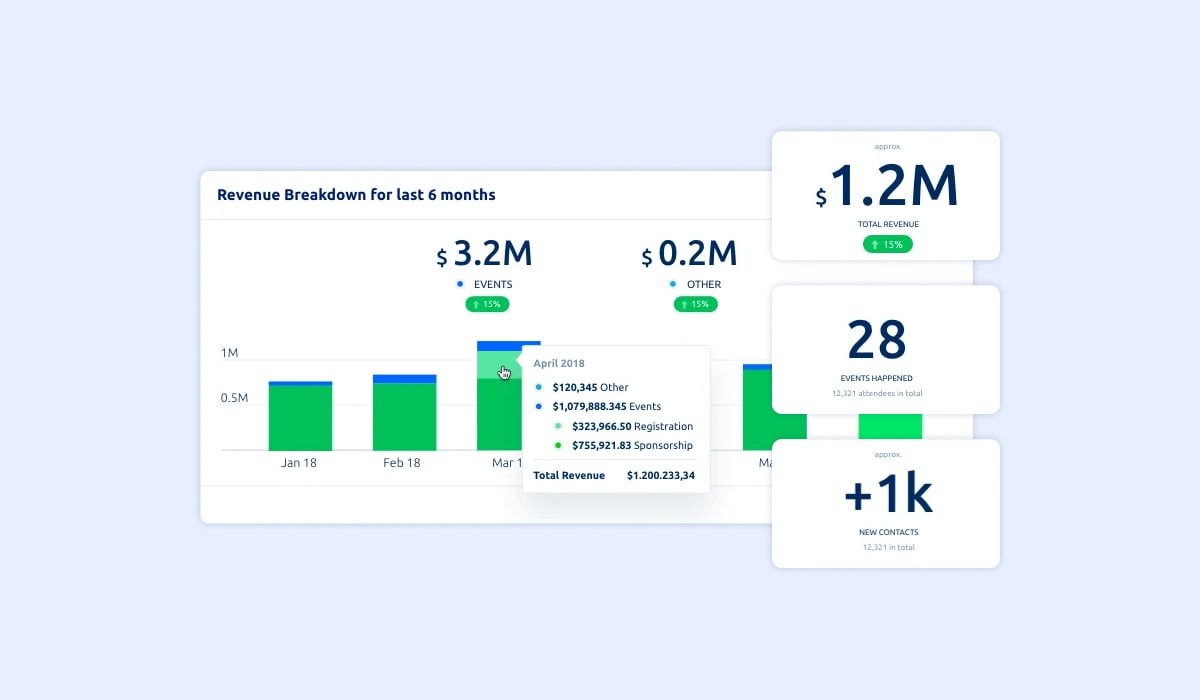
It is designed to seamlessly retain and grow member communities while streamlining management processes in the following ways:
Flexible Integration Of Payment Methods
Glue Up allows you to integrate any payment method you prefer—cards, bank transfers, digital wallets, etc. Regardless of your preferred online payment method, Glue Up will take care of most of them.
Also, you experience the freedom to cater to your members' needs by enabling payments in multiple currencies, making transactions easy and familiar in regional currencies.
Centralized CRM for Insights
The centralized CRM consolidates all your data, providing deep insights into member engagement. This allows you to understand your community's pulse and make informed improvements accordingly.
Comprehensive Membership Management Features
The Membership Management Software ensures all essential features for easy and smooth membership management.
In addition to these core functionalities, the software goes above and beyond by offering additional features to enhance the overall organizational experience. These supplementary features are:
- Unlimited Membership Types
- Auto Renewals
- Member Lists with Advanced Search Capabilities
- Automated Reminders
- Membership Directory
Accessibility, Privacy, and Analytics
Glue Up's software is accessible on all devices – be it mobile, desktop, Apple, or any other. On the other hand, you can benefit from custom privacy settings, which allow members to control their information. Meanwhile, engagement analytics allows monitoring of member engagement while displaying membership status.
If you think your membership management software could be more efficient than Glue Up and are ready to take your membership organization to new heights, book a demo with Glue Up.
Discover how our Membership Management Software can streamline your processes, enhance member engagement, and unlock exceptional growth and retention opportunities. Step into a new era of organizational efficiency and member satisfaction with Glue Up!


